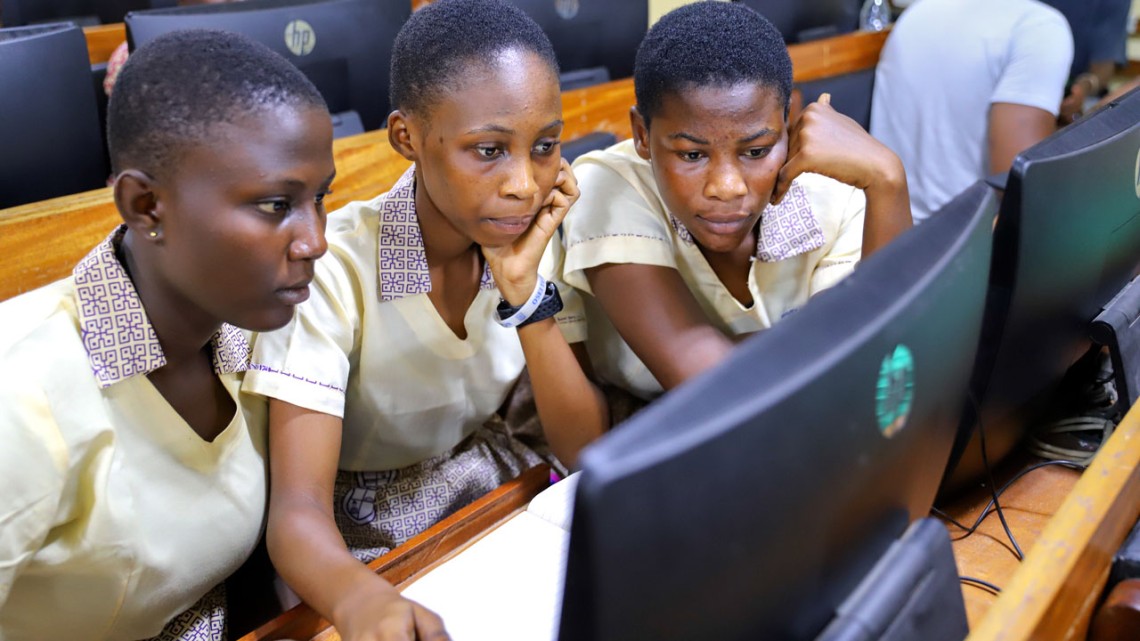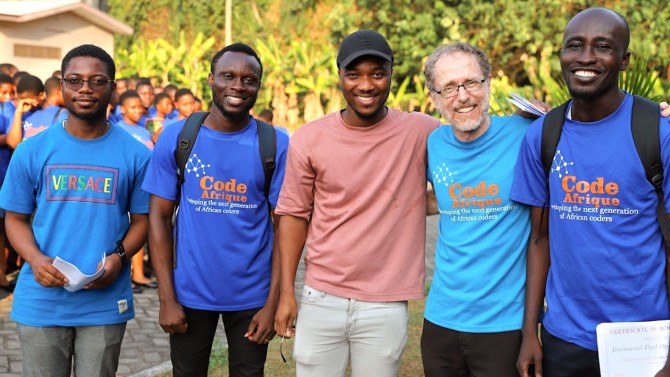
Students from Serwaa Nyarko Senior High School learned the basics of the coding language Python and worked on coding problems during the three-day workshop.
Code Afrique returns to Ghana to share opportunities in tech
By Patricia Waldron
Cornelius Boateng ’24 didn’t know anything about computer science when he participated in Code Afrique, a program that aims to introduce high school students to coding, in his native Ghana in 2018.
But his team won the programming contest, and later, he took online programming courses and wrote computer programs for fun. He planned to be pre-med at Cornell, but switched after a Ghanaian classmate told him about opportunities in tech. Post-graduation, he’ll begin a job at Microsoft.
“Not many people know what they can do with knowledge in computing,” he said. “People can do amazing things with it.”
Ghana’s fledgling tech sector has a chicken-and-egg problem: To grow, it needs trained, local workers, but without existing job opportunities, students don’t pursue degrees in computer science. Code Afrique aims to address this problem while creating awareness and opportunities for African students interested in tech.
Organized by a small team of alumni, students, faculty and staff in the Office of Diversity, Equity, and Inclusion in the Cornell Ann S. Bowers College of Computing and Information Science, Code Afrique returned to Ghana this year, after a three-year hiatus due to the COVID-19 pandemic. The team held a three-day coding bootcamp, which culminated in a programming contest. More than 150 students from 10 high schools participated in the workshop, held at the KNUST Junior High School in Kumasi, Jan. 8-10.
Cynoc Boahene ’20, now a software engineer at Google, founded the program as a sophomore at Cornell. He said companies like Google, Uber and Amazon have struggled to expand into African countries.
“We think differently, so they would want Ghanaians who understand the culture and the terrain – and also know how to code – to be the ones driving the innovation there,” Boahene said.
Boahene held the first Code Afrique in 2018 with support from family and friends. For 2019, he recruited Robbert van Renesse and Hakim Weatherspoon, both professors of computer science, who helped expand the program into two workshops, at Accra and Kumasi in Ghana. In 2020, they held the program in Eswatini and Ghana. To date, the group has reached more than 1,000 students, with nearly equal numbers of girls and boys.
This year, the Cornell Bowers CIS’s Office of DEI took over the organization and funding of the program, led by its director, LeeAnn Roberts.
“In addition to piquing students’ interest in programming, we try to give them tools and resources to develop their careers in the tech field, with advice on applying to universities abroad and accessing financial aid,” Roberts said.
Boahene initially planned to major in biomedical engineering and go on to medical school, but ultimately chose computer science after enjoying an intro course and finding more success with tech internships than medical ones. He wants current Ghanaian students – who cannot change their major once they enter college – to be aware of career opportunities beyond medicine. Many past participants have gone on to receive a computer science education, either in the U.S. or Europe.
“It’s been very emotional seeing people benefiting from the program,” Boahene said.
In addition to high school students, the volunteers trained 22 local teachers, covering the same programming material. Van Renesse and Boahene also discussed how to start a computing curriculum and found computer clubs. To encourage those advances, each teacher received a refurbished, donated laptop and joined a WhatsApp group to share ideas and resources.
Van Renesse, along with a group of Cornell students, also visited with administrators and faculty at local universities, with the hope of building relationships with Cornell that will advance local computer science education.
Goretti Muriithi ’26, an information science major, served as a mentor for the program, helping students to troubleshoot coding problems and think more like computer programmers. “It was awesome bringing in my knowledge about Python and programming and giving that back to the students,” she said.
Muriithi is originally from Kenya but has lived in the U.S. since 2006. She said the students were so involved in the lessons, they did not want to take breaks.
“They wanted to be in the classroom,” she said. “They were so ready to learn more code.”
Next year, the organizers hope to hold workshops not only in Ghana, but possibly Eswatini, Nigeria or Kenya.
“If we do want to catch up to the rest of the world,” Boahene said, “we need our best minds tackling these kinds of problems and designing systems and solutions that fit the needs of Africa.”
Patricia Waldron is a writer for the Cornell Ann S. Bowers College of Computing and Information Science.
Media Contact
Adam Allington
Get Cornell news delivered right to your inbox.
Subscribe

